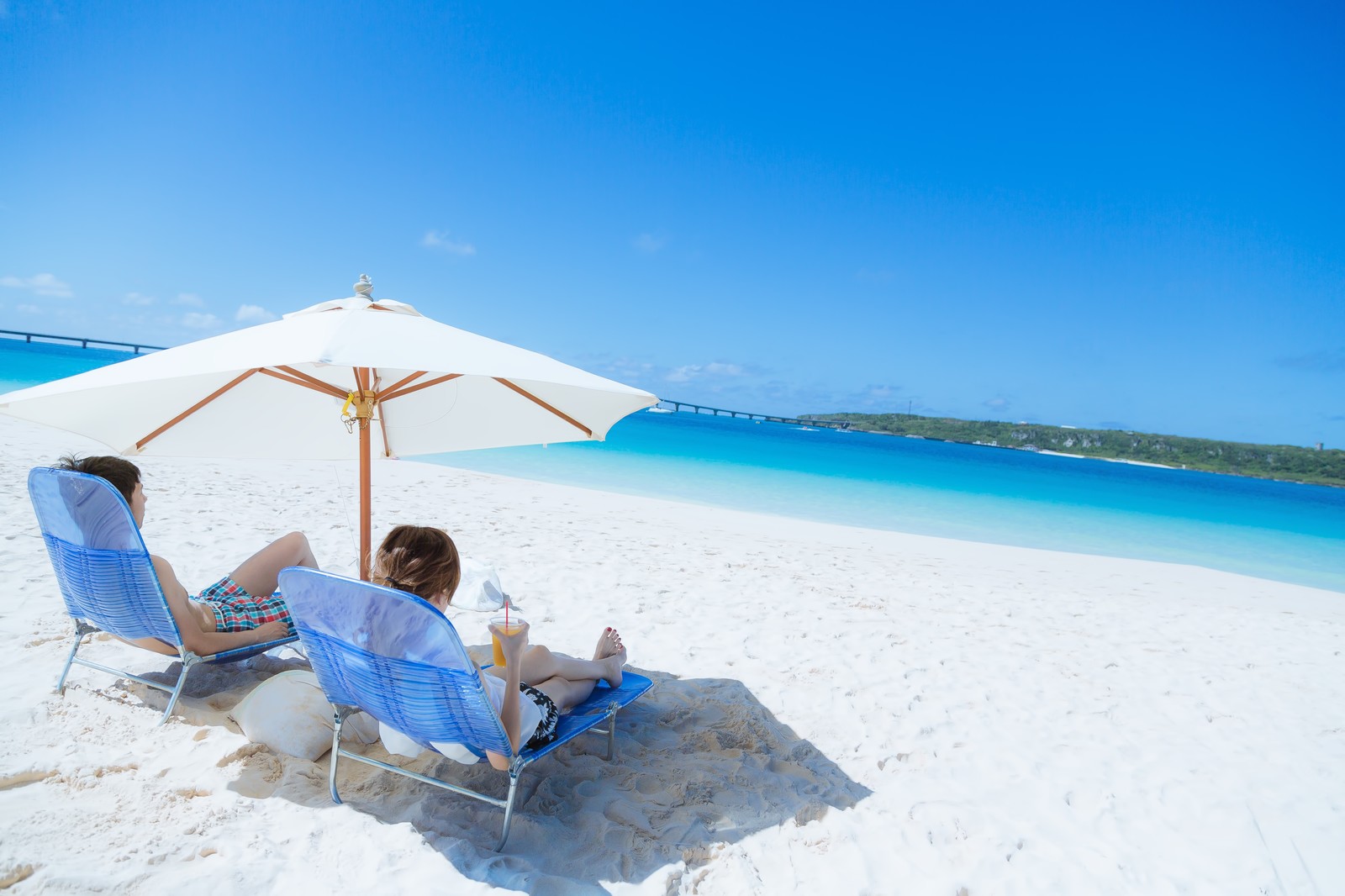
A cheap trick to make extra cash, or a man pushed to breaking point?
Not all Chinese tourists behave unruly, but the ones that do get so much public attention that it casts the rest in a bad light. Just to be on the safe side, China even launched a program to discourage such behavior.
Such misconduct has forced the hand of an unlicensed leisure equipment rental store owner at a Miyakojima beach in Okinawa Prefecture. A sign advertising the rental of a beach parasol set for 2,000 yen (US$18) had been erected, with another line stating “For Chinese: 20,000 yen”.
Unless the parasol came with air conditioning and a personal butler, no sane person would fork out $180 to rent an umbrella for a day. The proprietor had been tending his store for 14 years, but only recently put up the sign in July. He had this to say:
“Chinese tourists have terrible manners. I tolerated them for years, but since I didn’t want to lend it to them this time, I decided to charge them ten times more.”
The sign quickly led to complaints of discrimination, to which the owner replied:
“I’ve experienced a case where five Chinese tourists sat on a chair meant for only one, breaking it in the process. I didn’t want to lend it to them simply because I didn’t want any more broken chairs. It isn’t discrimination.”
While we’re uncertain if his claims are true, it did seem that the sign was set up in frustration rather than for financial gain. Although asking for recompense for broken equipment would have probably been a better alternative.
Nevertheless, the owner did eventually take down the sign amid mounting criticism. However, we’re merely scratching the surface of an underlying issue.
Since beaches are covered by Japan’s Seacoast Law, they’re currently managed at the prefectural level. But with many unlicensed marine leisure stores (such as the one upcharging Chinese tourists) popping up unchecked at the beaches around Okinawa’s Miyakojima city, the city council demanded the prefectural government crack down on illegal operators. However, the prefecture argued that since every city’s beach is different, the cities should manage their own beaches instead.
In short, the city council wants the prefectural government to deal with (ie: pay for) getting rid of the illegal stores, while the prefectural government wants the individual city councils to deal with them.
All this pushing of responsibilities has the Miyakojima Tourism Board throwing up its hands in the air and basically telling the two sides to get their acts together and sort it out soon, though with more diplomatic words.
For the sake of both tourists and honest operators in Okinawa, we hope so too. In the meantime, perhaps Okinawa could take a page from Kyoto and create guidelines for ill-mannered tourists.
Source: Yahoo! Japan, Miyako Shinpo via Hachima Kikou
Top image: Pakutaso

 Japanese drugstore sells onigiri at pre-stupid era prices, but how do they compare to 7-Eleven?
Japanese drugstore sells onigiri at pre-stupid era prices, but how do they compare to 7-Eleven? Japan Extreme Budget Travel! A trip from Tokyo to Izumo for just 30,000 yen [Part 1]
Japan Extreme Budget Travel! A trip from Tokyo to Izumo for just 30,000 yen [Part 1] Starbucks Japan releases first-ever Hinamatsuri Girls’ Day Frappuccino
Starbucks Japan releases first-ever Hinamatsuri Girls’ Day Frappuccino Japanese restaurant chain serves Dragon Ball donuts and Senzu Beans this spring
Japanese restaurant chain serves Dragon Ball donuts and Senzu Beans this spring Naruto and Converse team up for new line of shinobi sneakers[Photos]
Naruto and Converse team up for new line of shinobi sneakers[Photos] Japanese drugstore sells onigiri at pre-stupid era prices, but how do they compare to 7-Eleven?
Japanese drugstore sells onigiri at pre-stupid era prices, but how do they compare to 7-Eleven? Japan Extreme Budget Travel! A trip from Tokyo to Izumo for just 30,000 yen [Part 1]
Japan Extreme Budget Travel! A trip from Tokyo to Izumo for just 30,000 yen [Part 1] Starbucks Japan releases first-ever Hinamatsuri Girls’ Day Frappuccino
Starbucks Japan releases first-ever Hinamatsuri Girls’ Day Frappuccino Japanese restaurant chain serves Dragon Ball donuts and Senzu Beans this spring
Japanese restaurant chain serves Dragon Ball donuts and Senzu Beans this spring Naruto and Converse team up for new line of shinobi sneakers[Photos]
Naruto and Converse team up for new line of shinobi sneakers[Photos] Cute coffins now available at Tokyo’s coffin relaxation salon[Photos]
Cute coffins now available at Tokyo’s coffin relaxation salon[Photos] Japan has only one airport named after a samurai, so let’s check out Kochi Ryoma【Photos】
Japan has only one airport named after a samurai, so let’s check out Kochi Ryoma【Photos】 Tatami etiquette: Why you should never step on the threshold of a washitsu Japanese room
Tatami etiquette: Why you should never step on the threshold of a washitsu Japanese room A spotlight on Japanese singles figure skating: Jumping into the 2026 Olympics【Pt. II】
A spotlight on Japanese singles figure skating: Jumping into the 2026 Olympics【Pt. II】 Jamiroquai doll from Japan lets you control your own Virtual Insanity 【Video】
Jamiroquai doll from Japan lets you control your own Virtual Insanity 【Video】 The 10 most annoying things foreign tourists do on Japanese trains, according to locals
The 10 most annoying things foreign tourists do on Japanese trains, according to locals Highest Starbucks in Japan set to open this spring in the Tokyo sky
Highest Starbucks in Japan set to open this spring in the Tokyo sky Tokyo Skytree turns pink for the cherry blossom season
Tokyo Skytree turns pink for the cherry blossom season Starbucks Japan releases new sakura goods and drinkware for cherry blossom season 2026
Starbucks Japan releases new sakura goods and drinkware for cherry blossom season 2026 Japan’s new “Cunte” contact lenses aren’t pronounced like you’re probably thinking they are
Japan’s new “Cunte” contact lenses aren’t pronounced like you’re probably thinking they are Shibuya Station’s Hachiko Gate and Yamanote Line stairway locations change next month
Shibuya Station’s Hachiko Gate and Yamanote Line stairway locations change next month Yakuzen ramen restaurant in Tokyo is very different to a yakuza ramen restaurant
Yakuzen ramen restaurant in Tokyo is very different to a yakuza ramen restaurant Starbucks Japan adds new sakura Frappuccino and cherry blossom drinks to the menu
Starbucks Japan adds new sakura Frappuccino and cherry blossom drinks to the menu Japan just had its first same-month foreign tourist decrease in four years
Japan just had its first same-month foreign tourist decrease in four years Burning through cash just to throw things away tops list of headaches when moving house in Japan
Burning through cash just to throw things away tops list of headaches when moving house in Japan Japan’s newest Shinkansen has no seats…or passengers [Video]
Japan’s newest Shinkansen has no seats…or passengers [Video] Foreigners accounting for over 80 percent of off-course skiers needing rescue in Japan’s Hokkaido
Foreigners accounting for over 80 percent of off-course skiers needing rescue in Japan’s Hokkaido Super-salty pizza sends six kids to the hospital in Japan, linguistics blamed
Super-salty pizza sends six kids to the hospital in Japan, linguistics blamed Starbucks Japan unveils new sakura Frappuccino for cherry blossom season 2026
Starbucks Japan unveils new sakura Frappuccino for cherry blossom season 2026 Foreign tourists in Japan will get free Shinkansen tickets to promote regional tourism
Foreign tourists in Japan will get free Shinkansen tickets to promote regional tourism Take a trip to Japan’s Dododo Land, the most irritating place on Earth
Take a trip to Japan’s Dododo Land, the most irritating place on Earth Is China’s don’t-go-to-Japan warning affecting the lines at a popular Tokyo gyukatsu restaurant?
Is China’s don’t-go-to-Japan warning affecting the lines at a popular Tokyo gyukatsu restaurant? Survey asks foreign tourists what bothered them in Japan, more than half gave same answer
Survey asks foreign tourists what bothered them in Japan, more than half gave same answer Japan’s human washing machines will go on sale to general public, demos to be held in Tokyo
Japan’s human washing machines will go on sale to general public, demos to be held in Tokyo Starbucks Japan releases new drinkware and goods for Valentine’s Day
Starbucks Japan releases new drinkware and goods for Valentine’s Day We deeply regret going into this tunnel on our walk in the mountains of Japan
We deeply regret going into this tunnel on our walk in the mountains of Japan Studio Ghibli releases Kodama forest spirits from Princess Mononoke to light up your home
Studio Ghibli releases Kodama forest spirits from Princess Mononoke to light up your home Major Japanese hotel chain says reservations via overseas booking sites may not be valid
Major Japanese hotel chain says reservations via overseas booking sites may not be valid Put sesame oil in your coffee? Japanese maker says it’s the best way to start your day【Taste test】
Put sesame oil in your coffee? Japanese maker says it’s the best way to start your day【Taste test】 No more using real katana for tourism activities, Japan’s National Police Agency says
No more using real katana for tourism activities, Japan’s National Police Agency says Cute coffins now available at Tokyo’s coffin relaxation salon[Photos]
Cute coffins now available at Tokyo’s coffin relaxation salon[Photos] Japan has only one airport named after a samurai, so let’s check out Kochi Ryoma【Photos】
Japan has only one airport named after a samurai, so let’s check out Kochi Ryoma【Photos】 Tatami etiquette: Why you should never step on the threshold of a washitsu Japanese room
Tatami etiquette: Why you should never step on the threshold of a washitsu Japanese room A spotlight on Japanese singles figure skating: Jumping into the 2026 Olympics【Pt. II】
A spotlight on Japanese singles figure skating: Jumping into the 2026 Olympics【Pt. II】 Jamiroquai doll from Japan lets you control your own Virtual Insanity 【Video】
Jamiroquai doll from Japan lets you control your own Virtual Insanity 【Video】 Saitama is home to the best strawberries in Japan that you’ve probably never even heard of
Saitama is home to the best strawberries in Japan that you’ve probably never even heard of Tokyo Station staff share their top 10 favorite ekiben
Tokyo Station staff share their top 10 favorite ekiben Hey, 2020s kids! The ’90s have a sticker picture message waiting for you in Tokyo
Hey, 2020s kids! The ’90s have a sticker picture message waiting for you in Tokyo Live-streamer who slipped and died on Mt Fuji wins Darwin Award
Live-streamer who slipped and died on Mt Fuji wins Darwin Award Dark manga meets music — It’s Death Note the Musical!
Dark manga meets music — It’s Death Note the Musical! Viral 3D ice creams land in Japan… but are they worth the hype?
Viral 3D ice creams land in Japan… but are they worth the hype? Shibuya Station’s Hachiko Gate and Yamanote Line stairway locations change next month
Shibuya Station’s Hachiko Gate and Yamanote Line stairway locations change next month